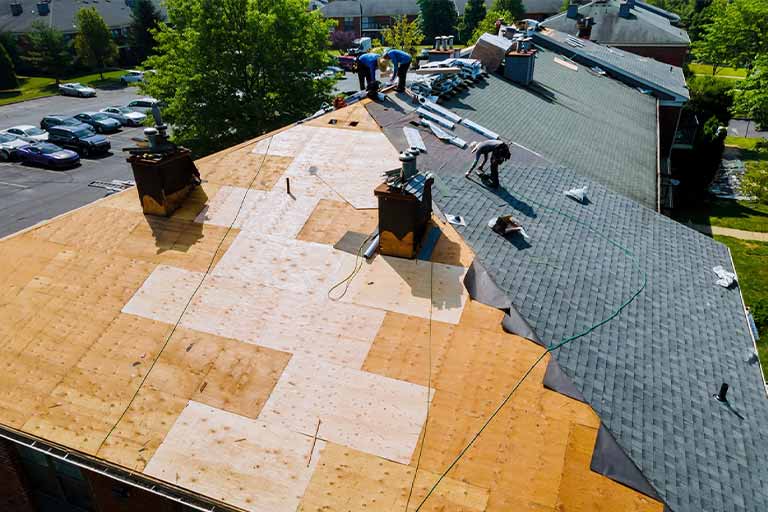
The Benefits of Using Plywood in Roofing
The Benefits of Using Plywood in Roofing
Plywood is a versatile building material made from thin layers of wood veneer. It is a popular choice for roofing due to its strength and durability. Roofing is a critical component of any building, protecting it from the elements. Plywood provides an excellent base for roofing materials, increasing the longevity and overall performance of the roof.
Types of Plywood for Roofing
There are several types of plywood available for roofing, each with its unique characteristics and advantages.
Film Faced Plywood
Film faced plywood is a type of plywood that has a smooth, non-porous surface. It is ideal for roofing because it is resistant to water, chemicals, and UV radiation. This type of plywood is also easy to clean, making it an excellent choice for roofing in areas with high pollution levels.
Hexa Plywood
Hexa plywood is a type of plywood that has a hexagonal pattern on its surface. This type of plywood is ideal for roofing because it is lightweight, durable, and easy to install. It is also resistant to water, making it an excellent choice for roofing in areas with high humidity levels.
Birch Faced Plywood
Birch faced plywood is a type of plywood that has a thin layer of birch on its surface. This type of plywood is ideal for roofing because it is resistant to water and has a smooth, even surface. It is also easy to paint or stain, making it an excellent choice for roofing in areas with different aesthetic requirements.
Laminated Birch Plywood
Laminated birch plywood is a type of plywood that has multiple layers of birch veneer. It is ideal for roofing because it is strong, durable, and resistant to water. This type of plywood is also easy to work with, making it an excellent choice for roofing in areas with complex roof designs.
Exterior Plywood
Exterior plywood is a type of plywood that is designed for outdoor use. It is ideal for roofing because it is resistant to water, moisture, and UV radiation. This type of plywood is also strong, durable, and easy to install, making it an excellent choice for roofing in areas with harsh weather conditions.
UV Prefinished Plywood
UV prefinished plywood is a type of plywood that has a thin layer of UV-resistant finish on its surface. It is ideal for roofing because it is resistant to water, UV radiation, and scratches. This type of plywood is also easy to clean and maintain, making it an excellent choice for roofing in areas with high pollution levels.
Thin Flexible Plywood
Thin flexible plywood is a type of plywood that is thin and flexible. It is ideal for roofing because it can be easily bent and shaped to fit around complex roof designs. This type of plywood is also lightweight and easy to install, making it an excellent choice for roofing in areas with limited access.
Advantages of Using Plywood in Roofing
There are several advantages to using plywood in roofing, including:
Durability
Plywood is a strong and durable material that can withstand harsh weather conditions. It is resistant to water, moisture, and UV radiation, making it an excellent choice for roofing in areas with extreme weather.
Cost-effectiveness
Plywood is an affordable building material that is readily available. It is also easy to install, reducing labor costs and installation time.
Sustainability
Plywood is a sustainable building material that is made from renewable resources. It is also recyclable, reducing the environmental impact of construction projects.
Strength
Plywood is a strong material that can support heavy loads. It is ideal for roofing because it can withstand the weight of roofing materials and support the structure of the roof.
Aesthetic appeal
Plywood is available in a variety of finishes and textures, making it an excellent choice for roofing in areas with different aesthetic requirements. It can be painted or stained to match the color and style of the building.
Easy installation
Plywood is easy to install, reducing labor costs and installation time. It can be cut to size and shape, making it an excellent choice for roofing in areas with complex roof designs.
How to Choose the Right Plywood for Roofing
When choosing plywood for roofing, it is essential to consider the following factors:
Plywood Grades
Plywood grades indicate the quality of the plywood. Higher grades are stronger and more durable, making them an excellent choice for roofing. It is essential to choose the right plywood grade for the specific roofing project.
Plywood Thickness
Plywood thickness is another critical factor to consider when choosing plywood for roofing. Thicker plywood is stronger and more durable, making it an excellent choice for areas with heavy rainfall or snow.
Plywood Slats
Plywood slats are the spaces between the plywood sheets. It is essential to choose a plywood with the right slat size for the specific roofing project. Larger slats allow for better ventilation, while smaller slats provide better insulation.
Exterior Plywood Grades
Exterior plywood grades indicate the quality of the plywood for outdoor use. It is essential to choose a high-quality exterior plywood grade for roofing in areas with harsh weather conditions.
In conclusion, plywood is an excellent choice for roofing due to its strength, durability, and cost-effectiveness. There are several types of plywood available for roofing, each with its unique characteristics and advantages. When choosing plywood for roofing, it is essential to consider the specific requirements of the roofing project. SFK Plywood is a leading supplier of high-quality plywood for roofing. Contact us today to purchase high-quality plywood for your next roofing project.
Looking for high-quality birch plywood for your next roofing project? Contact SFK Plywood today to learn more about our products and services. Our team of experts can help you choose the right plywood for your specific roofing requirements. Contact us today to get started!